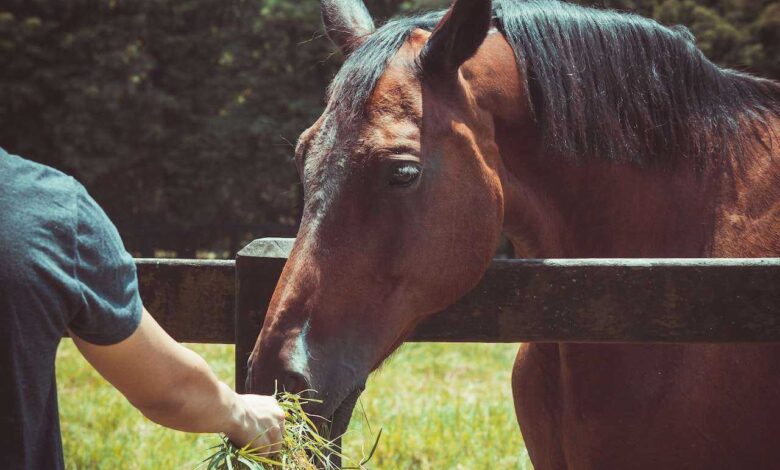
Your horse is more than a pet; it’s your loyal companion and, often, your partner in various equestrian pursuits. To ensure your noble steed thrives, you must master the art of horse nutrition. In this all-encompassing guide, we explore the intricacies of feeding your horse, from creating a balanced diet to addressing specific health concerns. Get ready to embark on a journey toward a healthier, happier equine friend.
The Fundamentals of Equine Nutrition
Understanding Horse Nutrition
Horses are unique creatures with specific nutritional needs. Start by comprehending these needs and the vital role various nutrients play in their overall health. Explore the importance of carbohydrates, proteins, fats, vitamins, and minerals in your horse’s diet. This foundational knowledge will serve as the cornerstone for providing optimal nutrition.
Horses are herbivores, which means they primarily eat plant-based diets. They have evolved to thrive on forage, such as grass and hay, which provides essential fiber and nutrients. Understanding the natural diet of horses is crucial for creating a balanced nutritional plan.
Crafting the Ideal Horse Diet
Creating a well-balanced diet for your horse is an art in itself. Discover the essential components of a horse’s diet, including hay, grain, and supplements. Dive into the intricacies of balancing these elements to cater to your horse’s age, activity level, and specific requirements.
Balanced nutrition ensures your horse receives the right amount of energy, protein, vitamins, and minerals. Hay and pasture are primary sources of forage for most horses, while grains and concentrates are added to meet additional nutritional needs.
Deciphering Horse Feeding Habits
Understanding your horse’s natural feeding behavior is essential for maintaining a healthy eating routine. Learn about their grazing habits, meal preferences, and the importance of regular feeding schedules. Armed with this knowledge, you can create a feeding routine that aligns with your horse’s instincts, promoting better digestion and overall well-being.
Horses are designed to graze for a significant portion of the day. Grazing allows them to digest food slowly, mimicking their natural behavior in the wild. Providing access to pasture or hay throughout the day supports this instinct and aids in proper digestion.
Specialized Nutrition for Health and Performance
Addressing Common Health Concerns
Horses, like humans, can face various health challenges. Dive into strategies for managing weight loss and promoting healthy weight gain. Explore how to support muscle building and maintain optimal hoof and coat health. With these insights, you’ll be well-prepared to address common health concerns and keep your horse in peak condition.
Weight management is crucial for horse health. Higherweight horses are at risk of various health issues, while underweight horses may require additional calories and protein for proper maintenance and recovery.
Customized Feeding for Specific Activities
Every equestrian pursuit demands a different level of performance from your horse. Whether they’re an endurance athlete, a racer, or a breeding champion, this section provides valuable guidance on tailoring their diet for optimal performance and post-activity recovery. Discover how to adjust your horse’s nutrition to match their athletic endeavors.
Endurance horses require diets that sustain energy levels over long distances, while racehorses need diets that support short bursts of intense speed. Understanding these differences allows you to provide targeted nutrition for your horse’s specific needs.
Adapting to Diverse Climates
Horses can find themselves in various environmental conditions, each requiring unique nutritional considerations. From scorching hot summers to frigid winters, learn how to adapt your horse’s diet to keep them comfortable and thriving. Temperature extremes won’t hinder your horse’s well-being with the insights you gain here.
Extreme temperatures can impact a horse’s water intake and energy requirements. Understanding these changes helps you adjust their diet accordingly to maintain health and performance.
Nutrition on a Budget
Providing quality nutrition for your horse doesn’t have to drain your wallet. Explore budget-friendly strategies that allow you to provide balanced and nutritious meals without compromising your financial stability. Your horse’s health doesn’t have to be a luxury; it’s an achievable goal.
Budget-friendly options often involve maximizing the use of high-quality forage and selecting cost-effective grain and supplement choices. Careful planning ensures your horse’s nutritional needs are met without excessive expenses.
Tailored Nutrition for Specific Scenarios
Caring for Horses with Health Issues
Sometimes, horses face health challenges like Cushings disease or laminitis. In this section, you’ll delve into the specifics of feeding horses with such conditions. Learn how to provide the right nutrients to support their recovery and well-being, helping them live their best lives despite health setbacks.
Horses with specific health issues often require customized diets. For example, horses with laminitis benefit from reduced sugar and starch intake, while those with Cushings may need dietary adjustments to manage hormone imbalances.
Optimizing Nutrition for Breeding
If you’re involved in breeding, this section is invaluable. Discover the intricacies of nourishing broodmares, stallions, and foals. Proper nutrition is essential for healthy pregnancies and the growth of strong, vibrant foals. Learn how to set the foundation for future champions.
Pregnant and lactating mares have increased nutritional needs to support the growth of the developing foal. Foals require specific nutrients for proper growth and development during their early months.
Creating Homemade Horse Feed
For those inclined toward DIY solutions, explore the art of crafting your own horse feed. Uncover the ingredients and ratios required to formulate a balanced, homemade nutrition plan. This hands-on approach allows you to have more control over your horse’s diet while ensuring they receive the best possible care.
Homemade horse feed can be tailored to your horse’s specific needs and dietary restrictions. However, it’s essential to consult with a veterinarian or equine nutritionist to ensure your homemade feed meets all nutritional requirements.
Storing and Transitioning Feed
Properly storing horse feed is crucial to maintaining its quality and safety. Discover the best practices for storing hay, grain, and supplements. Additionally, learn how to transition your horse to a new feed gradually, ensuring a seamless change in their diet without causing digestive issues.
Storing feed in a cool, dry place and keeping it protected from pests and moisture is essential for preserving its quality. Transitioning to a new feed should be done gradually over a period of several days to prevent digestive upset.
Horse Nutrition
Your horse’s nutrition is a cornerstone of their overall health and happiness. By mastering the principles outlined in this ultimate guide, you empower yourself to provide your equine companion with the best possible care. From creating tailored diets to addressing health concerns and budget constraints, you’re now equipped to nourish your brave and noble friend for a lifetime of vitality and strength. Remember, your horse’s well-being is a testament to the care and dedication you invest in their nutrition and overall happiness.








